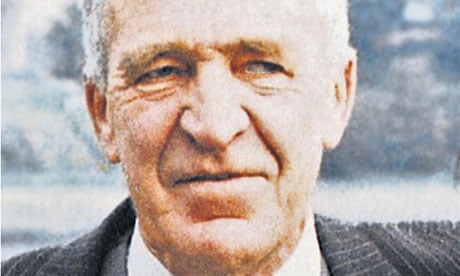John ("Ringo") Watson, who has died aged 82, represented what is best in the British army. The authorities might not, all of them, agree with that view – certainly not when he was displaying that quality in its bravest form.
Watson was born into a working-class family in Cambridge. He had two ambitions: to become a train driver and to play professional football. As he told me, shovelling coal put him off the first. Tottenham Hotspur showed interest, but that came to nothing and he joined the Suffolk Regiment as a private.
His battalion was posted to Palestine in 1948, as the British Mandate came to an end. Watson was appalled by the imminent destruction of the new state of Israel – attacked as it was on four fronts and wholly undefended by the British army. He thought it morally wrong that Jews, who had experienced so much already, should be slaughtered, again. Rifle in hand, he went over the wall to volunteer with Haganah and take part in front-line combat. In the siege of Jerusalem he was wounded. After the conflict he worked on a collective farm, where he met Ora, the woman he married. They went on to farm for four years.
In 1954 he and his wife resolved to return to Britain. He informed the authorities and on his arrival he was arrested and court-martialled for desertion, which he candidly admitted, and sentenced to a year in military prison, which he accepted as his due. The "glasshouse" was notoriously tougher than civilian prison. He was released, for good conduct after eight months and returned to the Suffolk Regiment.
Outstandingly tough, able and loyal, he clawed his way up to the rank of sergeant and finally warrant officer, fully aware that the rank he deserved, regimental sergeant major, would never, given his record, be achieved.
He served in Northern Ireland and was again wounded. Picking shrapnel out of open wounds with his bayonet became a sergeants' mess legend. In 1964 he took over responsibilities for TA recruitment in the larger catchment area now covered by the amalgamated East Anglian (later Royal Anglian) regiment. He was awarded the British Empire Medal for his success in this field. He was discharged after 29 years' service (seven of them awol) and went on to serve for 15 years as sergeant major to the Framlingham school cadet force. The school supplied the guard of honour at his memorial service at the Cretingham golf club (a game Watson took up in his last years).
I was, for a period, Watson's platoon officer. As I wrote in a later memoir, he was "the best, hardest and, in terms of military morality the most admirable soldier I ever knew". He is survived by Ora, and his daughters Carol and Debbie.
